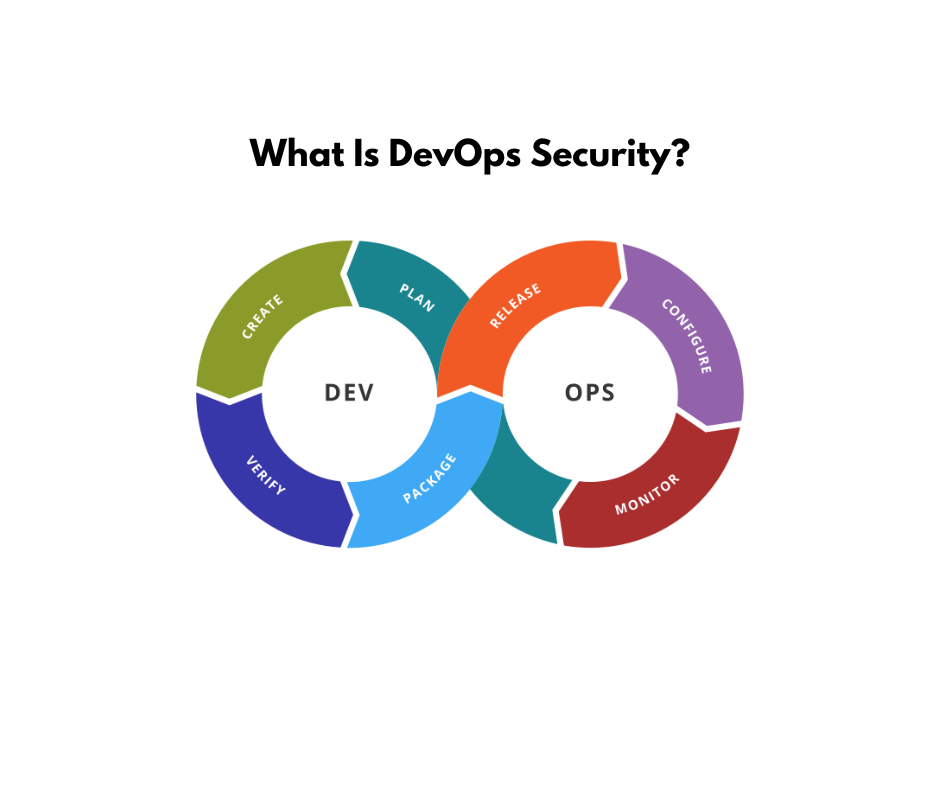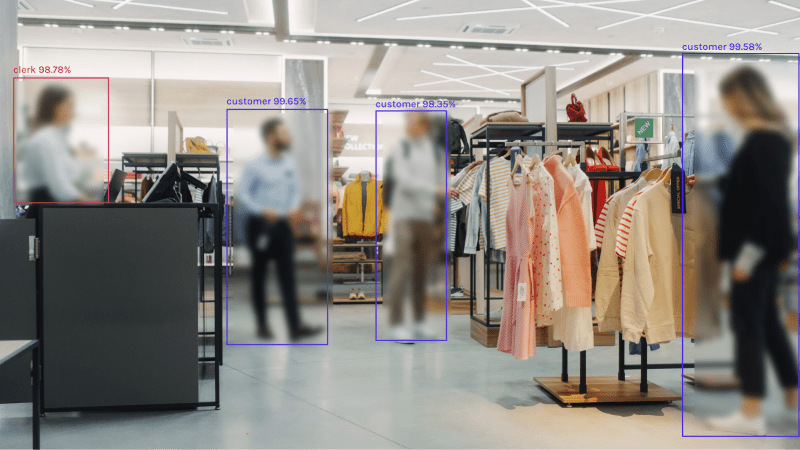What Is DevOps Security?

An Introduction To DevOps Security
DevOps security is an essential component of software development, ensuring that applications are safe from malicious actors and remain secure throughout the development life cycle. Collaboration between development and IT operations teams is crucial to ensure uniformity in security between teams. To plan for and manage security issues in a DevOps environment, one must first understand what DevOps security is and its benefits.
Put simply, DevOps security is a methodology of using security tools from the beginning of application development all the way through deployment, operations, maintenance, and retirement. This helps build secure applications with no vulnerabilities by integrating security into the DevOps process rather than treating it as an afterthought or separate entity. This type of approach allows for containers and microservices to be used more securely and silos between development teams can be removed with this approach as well.
The benefits of implementing a successful DevOps Security strategy include improved collaboration between dev and ops teams, reduced risk due to proactive detection and remediation, faster delivery cycles due to automated processes, improved scalability and flexibility due to containerized environments, better visibility across systems and processes, optimized resource utilization due to intelligent automation, improved response times when dealing with incidents or threats, and increased cost savings through automation and fewer manual tasks performed by personnel – all resulting in higher ROI.
To ensure uniformity between dev and ops teams, set clear objectives around data protection requirements ahead of time, establish policies around access control measures such as multi-factor authentication, track all changes made during deployment throughout their lifecycle with version control tools, and consider adopting industry standards such as OWASP Top 10 Application Security Risks.
Security is an essential component of any successful DevOps project but requires ongoing effort and collaboration between both developers and IT operations staff alike. Introducing a ‘DevSecops’ culture within organizations is key to ensuring system integrity remains intact at all times and projects run smoothly without experiencing any unnecessary delays caused by unexpected issues arising out of inadequate planning or execution.
A Holistic Approach To Security In DevOps Environments
The DevOps paradigm has revolutionized software development and deployment. However, its advantages come with security risks that must be addressed for the safety of applications and data. A holistic approach to security in DevOps is essential for organizations embracing this new way of working.
A holistic approach requires implementing systems and frameworks to ensure secure operations throughout the development cycle. This includes defining a secure build process, identifying potential risks early on, performing security testing at each stage, continuously monitoring deployments, implementing automated compliance controls, and developing secure coding standards.
Measures to detect vulnerabilities early involve educating developers and operators, introducing automated security testing tools, and providing secure infrastructure. Regular reviews of security metrics and patching known vulnerabilities are also necessary. Integrating logging tools with DevOps tools and encouraging collaboration between development teams and IT Security departments creates a secure deployment environment. Kelly Technologies DevOps Training in Hyderabad is a one-stop destination for all aspiring professionals who wish to gain expertise in the domain.
The Benefits Of DevOps Security
DevOps security is a set of practices designed to protect and manage digital assets during the software development process. By leveraging automated tools and agile practices, DevOps security helps identify, respond to, and resolve potential security issues quickly. It can also monitor application and system performance, detect and respond to potential threats, automate patching processes, and improve operational efficiency. Automation of these processes can reduce the time it takes to harden application and infrastructure layers.
DevOps security leads to reduced risk by increasing visibility into security risks and decreasing the attack surface. It also helps secure data in motion across multiple systems by performing critical checks before deployment, threat modeling, vulnerability management, monitoring applications, testing code regularly, implementing access control and authentication/authorization procedures, adopting secure coding standards and configuration management protocols, protecting data at rest and in transit, ensuring server and cloud deployments are secure, establishing backups and disaster recovery plans for data protection, performing code reviews/audits frequently, implementing automation tools for applications/infrastructure management activities, staying up-to-date with patches/updates on a regular basis, and educating staff on safety best practices.
By integrating security into every step of the software development lifecycle (SDLC) from design through delivery, organizations can practice DevOps processes and techniques enabling them to deliver software faster while maintaining a high level of quality and safety. With DevOps Security in place, organizations can ensure their digital assets are managed properly while focusing on creating new products without worrying about potential threats or issues that may arise along the way.
How DevOps Can Enhance The Security Of Your Infrastructure
In today’s world of digital transformation and cloud-native infrastructure, DevOps plays an increasingly important role in securing an organization’s infrastructure. DevOps security involves applying DevOps principles and practices to ensure the security of the infrastructure. This involves understanding the impact of DevOps on security, using appropriate tools and techniques to integrate security into the development process, and establishing policies, processes, and technology to secure the entire environment.
To ensure maximum efficiency, organizations must combine DevOps with best practices in securing sensitive data, preventing unauthorized access, and automating the continuous delivery/deployment process. Additionally, security integration should be articulated into application design by implementing secure coding practices and conducting Security Quality Assurance (SQA) tests to identify potential risks or vulnerabilities.
Finally, to seamlessly integrate DevOps with existing security strategies, organizations must adopt a holistic approach by uniting their Development (Dev), IT Operations (Ops), and Security (Sec) teams toward the common goal of secure application delivery without compromising performance standards. With these best practices in place, organizations can confidently embark on their digital transformation journey while protecting their applications from potential threats.
DevOps Security Best Practices
DevOps Security is crucial for software development, requiring a comprehensive approach to ensure application safety and security. Addressing security requirements throughout the development process, from design to deployment, is key. To protect applications and data, it’s essential to understand DevOps Security fundamentals and leverage automation for security posture assessment and monitoring. A zero trust mentality and investment in tools that enable secure continuous delivery across multiple environments is necessary. Static code analysis tools and application security testing serve as quality assurance while strong authentication measures and access control policies ensure only authorized personnel securely access resources. Protecting cloud infrastructure from unauthorized access requires encryption techniques and firewalls. Monitoring user activities and audit logs with automated threat detection technologies helps identify any suspicious activity and promptly respond. Investing in staff training on DevOps Security best practices to stay informed of new threats and industry standards is vital.
How To Enhance IT Security With DevOps Techniques
DevOps is an increasingly popular method for managing IT security in businesses. DevOps combines development and operations, utilizing automation tools to improve collaboration between software development and IT operations teams. This approach enhances IT security by allowing businesses to gain better visibility into their environment and implement secure code review systems. In this article, we will explore DevOps security and the tools available to help organizations improve their IT security.
Overview of DevOps security and its importance. By utilizing automation tools like containers or continuous integration/continuous delivery (CI/CD) pipelines, organizations can improve their environment visibility while enhancing collaboration between Development and Operations teams. This improved visibility enables teams to quickly identify potential weak areas and reduce risk in the long term. Furthermore, automated testing practices employed at every stage of the pipeline ensure code changes comply with industry standards and any internal policies set by the organization before deployment.
Specific benefits of implementing DevOps Security practices, including Infrastructure as Code (IaC), secure code review systems, compliance policies integrated into development processes, automated vulnerability scanning for potential infrastructure or application weaknesses, real-time monitoring and alerting for potential risks identified by scans and reviews, and automated security tests at every layer of the pipeline prior to deployment. These practices reduce risk while providing developers and operations staff increased flexibility in making changes without sacrificing compliance or accuracy. Additionally, cloud environments benefit from enhanced access control measures that give teams greater control over who has access to sensitive data across multiple cloud providers if needed.
Finally, continuous integration and deployment automate processes such as builds and deployments based on predefined parameters, reducing the likelihood of human error while still providing developers freedom when coding. Combining these techniques with existing best practices such as Security Information Event Management (SIEMs) solutions, organizations can ensure real-time monitoring of all aspects related to their applications’ performance, enabling them to quickly detect any unexpected deviations from normal behavior and reduce risk exposure.
By adopting a comprehensive approach that ensures compliance through policy enforcement and utilizes automation where possible, organizations can enhance their IT security posture. This results in a secure yet agile organizational structure that can respond quickly to changing market conditions without introducing unnecessary risks. This article in the todaybusinessposts must have given you a clear idea about Overview of DevOps security.





